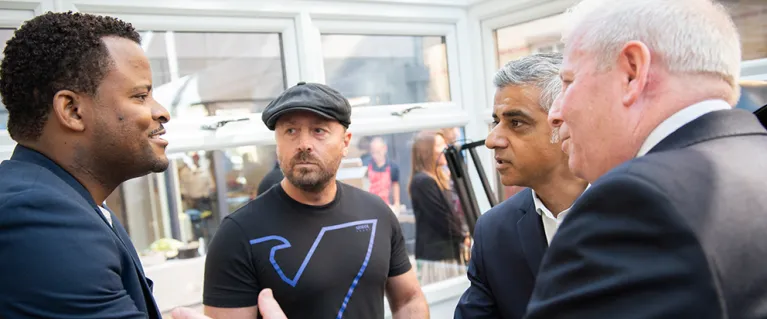
What the Mayor is doing to tackle rough sleeping
The Mayor is taking both immediate and long-term action through his Life Off the Streets programme to get rough sleepers the support they need.
Life Off the Street services
The Mayor’s Life off the Streets services helped 5,455 people between March and December 2019.
Immediate support
- Opening additional emergency shelter, in partnership with London boroughs, when temperatures fall below zero.
- Doubling the number of his street outreach workers last winter.
- Including a rapid response team as part of his street outreach to get to rough sleepers sooner.
- Providing immediate accommodation to new rough sleepers through his No Second Night Out service.
- Launching mobile homelessness hubs in areas where there is a sudden rise in rough sleeping.
- Working with Veterans Aid to help over 300 veterans at risk of homelessness get off the streets.
- Funding a shelter for LGBTQI+ people in crisis to help prevent them ending up on the streets.
- Helping reconnect rough sleepers to their local area elsewhere in the UK.
- Opening shelters throughout winter, including 300 more beds than last year in January and February through the Winter Programme Fund.
Longer term support
- Doubling our budget for rough sleeping services to £18 million
- Investing over £1 billion to fund 11,000 new council homes for social rent to help address the long-term causes of rough sleeping and the broader housing crisis
- Working with London’s councils on the In for Good programme, to ensure that no one in a severe weather emergency shelter leaves without an offer away from the streets
- Providing 3,700 low rent homes in London for former rough sleepers, supported by the Mayor’s Tenancy Sustainment Teams, to help people live independently
- Using social impact bonds to fund service providers, helping long-term rough sleepers into accommodation
- Calling on government to invest more in tackling the root causes of homelessness, such as welfare cuts and the lack of affordable housing.
How the Mayor supported people sleeping rough during the pandemic
The effects of the COVID-19 pandemic were felt by many in London, and the homeless population in the city were among one of the most vulnerable groups. With people sleeping rough being significantly more likely to have underlying health conditions than the wider population and far less likely to be in a position to follow many aspects of Public Health guidance, it was of great importance to the Mayor that this group were given as much support as possible to ensure that their health and safety was prioritised.
The GLA swiftly responded to the COVID-19 emergency by securing hotels and related support, food, security, cleaning and other services – as well as transport to the hotels. At the peak of the pandemic, the GLA had 14 hotels with a capacity for around 1,400 people. This included a 59-bed COVID-care hotel for individuals who were not only COVID-positive but also those who were not displaying symptoms but were vulnerable because of underlying health conditions.
Following the easing of the first lockdown period, the GLA and boroughs moved into the next phase of supporting rough sleeping through the implementation of the Mayor’s ‘In For Good’ principle. This phase consisted of offering support to everyone in the hotels to ensure that no one would need to return to rough sleeping when they left and could positively move on to settled accommodation. As of October 2021, more than 1560 people have positively moved on from GLA hotels.
Thanks to the rapid and comprehensive response of the GLA and London boroughs, rates of COVID-19 infection among London’s rough sleepers were far below that seen in other world cities. Due to the early action taken to enable those sleeping rough to self-isolate, there were also far fewer referrals to GLA hotels than anticipated for people displaying COVID-19 symptoms.
There is no denying that homelessness in London is still a pressing issue. However, the Mayor, in partnership with London’s councils, charities, health and others, continues to remain dedicated to ensuring that those sleeping rough get the support they need to not only be appropriately accommodated and kept safe during the continuing pandemic and winter, but also by developing initiatives and options that enable individuals to successfully transition to independent living.
Get involved
Need a document on this page in an accessible format?
If you use assistive technology (such as a screen reader) and need a version of a PDF or other document on this page in a more accessible format, please get in touch via our online form and tell us which format you need.
It will also help us if you tell us which assistive technology you use. We’ll consider your request and get back to you in 5 working days.